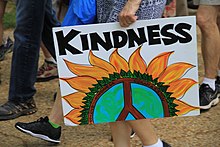Boot
An boot iyo an klase nin gawe na markado kan mga akto nin pagigin matinao-tao, konsiderasyon, mag-opresir nin tabang, o pagmakulog sa iba, mayong linalaoman na pag-omaw o gawad bilang sukli.


An boot iyo an tema nin interes sa pilosopiya, relihiyon, asin sikolohiya. An boot iyo an saro sa pangenot na tema sa Bibliya. Sa Book II kan Rhetoric, Aristotle piglaladawan an boot bilang "pagigin matinabangon sa ibang tawong nangangaipo, bako huli sa gawad, bako huli sa bentahe kan paratabang mismo, alagad para sa tawo na pigtatabangan".[1] Friedrich Nietzsche considered kindness and love to be the "most curative herbs and agents in human intercourse".[2] An boot iyo an saro sa Knightly Virtues.[3] Sa mga katokdoan ni Meher Baba, An Dios iyo an kasingkahulugan kan kabootan God: "An Dios maboot na marhay na imposibleng imahinaron an saiyang mayong kasagkoran na kabootan!"[4]
Toltolan
baguhon- ↑ Aristotle. Rhetoric. Translated by Roberts, W. Rhys. Book 2, chapter 7. Archived from the original on December 13, 2004. Retrieved 2005-11-22. Unknown parameter
|url-status=ignored (help) - ↑ Nietzsche, Friedrich Wilhelm (1996) [1878]. "On the History of Moral Feelings". Menschliches, Allzumenschiles [Human, all too human: a book for free spirits]. Translated by Faber, Marion; Lehman, Stephen. University of Nebraska Press. Aphorism 48.
- ↑ Singla, Parvesh. "Character". The Manual of Life: Understanding Karma/Right Action. Parvesh singla – via Google Books.[nangangaipo nin pahina]Plantilya:Self-published inline
- ↑ Kalchuri, Bhau (1986). Meher Prabhu: Lord Meher. 11. Myrtle Beach: Manifestation, Inc. p. 3918.